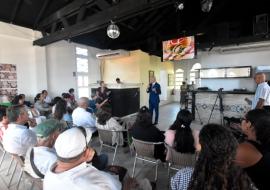Cuba’s Tourism Strategy, Policy Need Some Tweaking

The update of Cuba’s economic model engulfs the stepped-up implementation of a tourism strategy and policy in the country – for both state-run and private sectors – by taking into account, for instance, the contracts with private tenants, Miriam Rendón, president of Formatur, said during a panel on Economy in Cuban Catering, held within the framework of Excelencias Gourmet 4th International Gastronomic Seminar.
She placed emphasis on the significant role played by gastronomy in terms on tourism incomes, and MINTUR pays attention to this factor, especially everything related to freelancers, since agreements have been inked between travel agencies and private sector representatives.
There are nearly 666 private houses that accommodate tourists by means of contracts signed with travel agencies and there are 14 non-agricultural cooperatives scattered in eight provinces, such as Guantánamo, Villa Clara, Camaguey, Santiago de Cuba, Pinar del Río, Granma.
In order to share their experiences, the panel counted on the participation of Alina González Ram, from the recently created La Divina Pastora cooperative, who talked about the Decree 305 that provides legal framework to these new management methods for collective property; and Gustavo D’Mesa, maître d’ Los Nardos restaurant, an Asturian society with license to operate and provide gastronomic services, which is very acclaimed by the inhabitants of Havana and foreign visitors.
Mesa discoursed on the motivation, performance and role of human resources as the main asset of that intangible capital, which is the base for tacit and explicit knowledge of the collective of workers in any company or organization, and underlined different theories aimed at making the most of the workforce, such as ideal working conditions, moral and material stimulation, among others.
The morning session was also attended by Mario Escalona Serrano, director of the Musical Recordings and Editions Company (EGREM is the Spanish acronym), who tackled the links between catering and the music industry as a variable that can complement gastronomy and its excellence, starting with alliances that could be very profitable.














